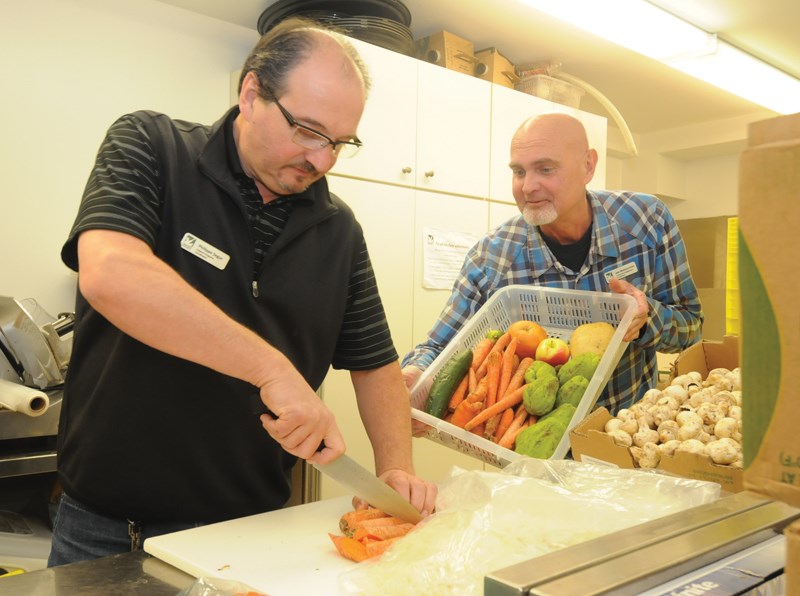Harvest Project never gives up hope.
Within a three-week period recently, three big donations came in for the North Shore non-profit organization which helps residents who are experiencing extreme challenges with family breakdowns, illnesses, job loss, and poverty.
Harvest Project has received a $10,000 grant from Vancity credit union so they can start including repackaged produce in their Food for Hope program.
At the same time, to help get the Harvest kitchen ready for slicing and dicing, a local businesses stepped up to the plate.
North Vancouver-based mechanical contractor Modern Niagara donated kitchen and bathroom fittings, and commercial taps. Plus, the company sent a volunteer team to Harvest Project to renovate their kitchen and food prep areas.
A group of specialists from Modern Niagara manufactured custom sheet metal for Harvest Project’s commercial kitchen – an area used not only to prepare meals for patrons, but also to re-train individuals wanting to re-enter the workforce.
Now that Harvest Project has a kitchen with stainless steel appliances and spaces that are food safe, they can move into repackaging tomatoes, carrots, onions, fresh herbs and the like for their clients.
Using a food recovery model, Harvest Project salvages around $50,000 worth of food each month from the community through donations from individuals, businesses, schools and other organizations.
“The food that we receive is used to stock our grocery depot, a place which Harvest Project clients visit on a monthly basis by personal appointment to obtain free food for themselves and their families,” explains Philippe Segur, support programs co-ordinator at Harvest Project.
In addition to non-perishable food items, Harvest Project is also able to offer fresh healthy produce to their clients. The produce they receive is donated by local grocery stores, the Edible Garden Project and residential gardeners in the community.
“We typically have more produce offered to us than we are able to accept; however, thanks to a recent donation of cold storage merchandisers, we now have the capacity to receive, process and redistribute an increased volume of produce,” says Segur.
Through its Food for Hope initiative, Harvest Project has recently started experimenting with re-packaging produce.
“We have found our clients to be quite receptive,” says Segur.
“We notice that a bag of washed and cut mixed vegetables can be more appealing and less intimidating than vegetables in their natural form. In addition, many of our clients are single parents, so they naturally gravitate towards healthy convenience foods for their families.”
Until recently, Harvest Project has only been able to offer these produce packages on a trial basis, due to limited staffing resources. However, Harvest Project will soon be in a position to hire a staff member who has line cook experience and is FoodSafe-certified who can undertake the processing and packaging of vegetables.
Segur hopes to build on the initiative by adding a training piece in the kitchen. One of Harvest Project’s community partners is the HOpe Centre, whose clients come and work in the kitchen for a couple hours at a time.
“These are a group of people that need to either relearn a new skill because of what they have dealt with, and now are in a position where they want to get back on track,” explains Segur.
There is now a space and opportunity for other social service agencies to send their clients to Harvest Project where they can learn FoodSafe certification, knife skills, and other culinary training at their own pace in a less stressful environment.
For professional chef Segur, who for years was at the helm of Le Bistro Chez Michel restaurant in Lower Lonsdale, he’s happy to put his cooking skills to good use these days.
“If you talk to a lot of chefs when you produce something the goal is to be able to look at the person when the plate goes out,” says Segur. “It’s the same here, except when you have somebody in need who walks in the grocery store and looks at the fridge full of vegetables and fruits and goes 'thank you' – that is even more rewarding.”



